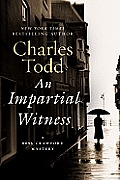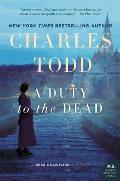
We've had a great run with our Inspector Ian Rutledge series — we've had 12 books to get to know his character, his strengths and any weaknesses, and where he's heading as he handles each case. He's even found himself on the
New York Times bestseller list, and his many fans are devoted to him. We've been told that the next Rutledge, out in January 2011, is the strongest yet.
Why, with all this success, have we added a second series with a new character? And was it hard to go back to square one with Bess Crawford?
Actually, over the years there were plots we'd considered for Rutledge, only to discard them because his professional approach, through Scotland Yard, would alter how the story unfolded. After a while we realized that a person like Bess was the perfect choice to solve such mysteries.
But what else should she be? A strong person, for one thing. Consider Miss Marple — she's an elderly spinster, but she has an iron core as well as a thorough understanding of human nature. And we, like many of today's readers, still look for both in a female protagonist. But how does Bess, a young woman, come by courage and such understanding? Through her upbringing — not the traditional English schooling with its Victorian overtones but living amongst other cultures from an early age. Who then were her parents, to provide such experiences? A career Army officer and his wife. And so from her father and his long line of officer ancestors came her sense of duty, her strong feeling about becoming a nursing sister when the Great War began, and her knowledge of weapons and the toll of war. From her mother comes the strength of character that made Mrs. Crawford a good Army wife in strange surroundings, Bess's compassion for people, and her sense of humor.
Still, it wasn't until we sat down to write the first book in the series, A Duty to the Dead, that we discovered her determination to do what was right, even at personal risk. After Britannic hits a mine in the middle of the Mediterranean Sea late in 1916, Bess is sent home to recover from a broken arm. But more pressing is the promise she made to a dying officer, and as soon as she can travel, she calls on his family to carry out his last wish. A simple duty, or so it appeared. But the Graham family is less than grateful, and Bess is confused. If the message was so urgent that it had to be delivered in person, why is it treated as trifling by the dead man's mother and brother? What is her duty now? To walk away — or to try to understand what Lieutenant Arthur Graham felt was left undone by his death? Events soon propel her into the middle of a secret that has been kept for 15 years and Bess realizes that she must carry out Arthur Graham's wishes herself. We followed her lead throughout the book, and discovered something else about her: she doesn't flinch in the face of death, but she is human when it comes to love.
 In An Impartial Witness, an understaffed and overworked Scotland Yard believes Bess is swayed by a handsome face when she attempts to persuade them that truth wears many disguises. She's under fire in France, and in England finds herself in the sights of a ruthless killer. Finally she must trust to her own instincts, and do what she can to see justice done, even against impossible odds. An Impartial Witness is also an opportunity to see more of her relationship with her mother and the Colonel Sahib, as they call her father behind his back, and a dinner party that is a tribute to her mother's creativity in the face of food shortages. And then there is Simon. What is her relationship to him? Or his to her? The answer is elusive.
In An Impartial Witness, an understaffed and overworked Scotland Yard believes Bess is swayed by a handsome face when she attempts to persuade them that truth wears many disguises. She's under fire in France, and in England finds herself in the sights of a ruthless killer. Finally she must trust to her own instincts, and do what she can to see justice done, even against impossible odds. An Impartial Witness is also an opportunity to see more of her relationship with her mother and the Colonel Sahib, as they call her father behind his back, and a dinner party that is a tribute to her mother's creativity in the face of food shortages. And then there is Simon. What is her relationship to him? Or his to her? The answer is elusive.
We're working on next summer's Bess Crawford. It's mid-December 1917, and an impulsive good deed soon leads Bess into unexpected trouble. Before very long she finds herself a suspect in a murder, with no alibi. What happens next is a heart-wrenching search through war-torn France for an innocent person who may be at risk.
And there's much more to come... stay tuned.
÷ ÷ ÷
In addition to Bess, here are some other ongoing characters in the series you may wish to know more about:
Mrs. Hennessey: The widow who has turned her London house into flats as her part in the war effort. Bess Crawford is one of several nursing sisters who have taken the first floor rooms and live there when they have leave. Mrs. Hennessey, strict and caring, keeps an eye on all her tenants, but has a special fondness for Bess.
Mrs. Crawford: Bess's mother, who chose to keep her only child with her in India and other outposts of Empire rather than send her to England to be educated, has spent her married life following her soldier husband as he serves King and Country. She has learned to cope even in appalling conditions, and makes the family home in Somerset a sanctuary from war. It is from her that Bess has inherited her own strength, her keen understanding of people, and her sense of humor.
The Colonel Sahib: This is the title mother and daughter have given the Colonel behind his back. Coming from a long line of soldiers, Richard Crawford retired as Colonel of his regiment, leaving behind a distinguished record and taking with him the respect of his men. He continues to serve in other capacities throughout the war. Bess has learned her sense of duty from her father as well as grace under pressure and her knowledge of when to attack and when to retreat.
Mrs. Melinda Crawford: An elderly relative who survived the Great Indian Mutiny of 1857, married her officer cousin against all advice, lived happily ever after until his early death, and then traveled the world on her own — a shocking example of female independence. Retired to her house in Kent, she understands better than most why Bess decided to become a nursing sister in France. It is what she herself would have done if she had been younger in 1914.
Simon Brandon: As a young soldier Simon served under Richard Crawford and rose through the ranks to become Regimental Sergeant-Major. Retiring when his mentor left the Army, Simon never speaks of his past, his devotion to Mrs. Crawford, which has raised eyebrows, and his unswerving loyalty to the Colonel. It was Simon who taught Bess to ride, to shoot, and later to drive a motorcar, and it is to Simon she turns when she can't talk to her parents.